Burnout- The Student Epidemic
Second semester has started, and many students find themselves in a tricky situation. As testing and homework piles on, many students find themselves struggling to keep up and balance their workloads. Many students who find themselves struggling with self-motivation are experiencing what is called burn out. Burn out torment’s students nationwide, leaving them tired and exhausted. Burn out, when not delt with properly, can even land students in depression.
Burnout is a state of mental, physical, or emotional exhaustion; of course, some stress is necessary for students to achieve an important goal. For example, if a student needs to pass an important exam they would stress and study but like everything, it is not the substance that is poisonous it is the dose. The problem arises when the work and stress is nonstop.
At first, students may continue to do well at the projects they have been initially trying to accomplish, they keep pushing themselves to work harder without basking in the joy of their accomplishments. They don’t have enough time to rest and recharge before the next big task, after a while all this heavy stress takes a toll on one’s mental, physical and emotional health.
Burnout reduces productivity and sucks out your energy, leaving you feeling overwhelmingly helpless, lost, cynical, and that nothing is worth it. These negative thoughts and feelings can spill into other areas of your life including home, work, and social life affecting your relationships. Burnout can also cause unhealthy effects on your body making you more susceptible to illnesses like colds and flu.
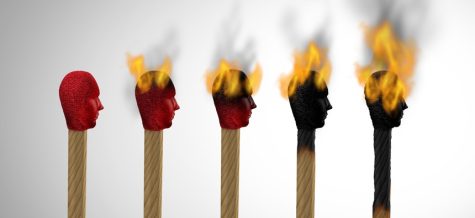
Everyone has days where they feel hopeless, overwhelmed and underappreciated- getting out of bed requires a lot of motivation; if you feel like that most of the time, then you may be burned out.
Burnout is in discriminant, affecting all students, regardless of grade level. Freshman, Amaya Ramsey, an AP student taking AP Psych and AP Human Geography finds those are her most challenging classes. Ramsey states the workload is “definitely higher than the past two quarters, they (AP Psych and Human Geography) are also more demanding than before.” The continuous unloading of work stacks up and creates anxiety, stress, and overwhelming feelings among students. Ramsey relates to feeling overwhelmed, she states, “I’m more overwhelmed than last quarter, and the quarter just started.” Many student wish teachers would slow down and assign less work to calm their stress, Ramsey agrees wishing teachers “gave us longer time periods to complete work.”
Burnout is a slow, gradual process and it doesn’t happen overnight; the signs may not be noticeable at first or be shrugged off as a few bad days, but it can get worse as time goes on. If you pay attention and actively reduce your stress, you can prevent a major breakdown. If you ignore the signs and continue to work, you will be burned out.
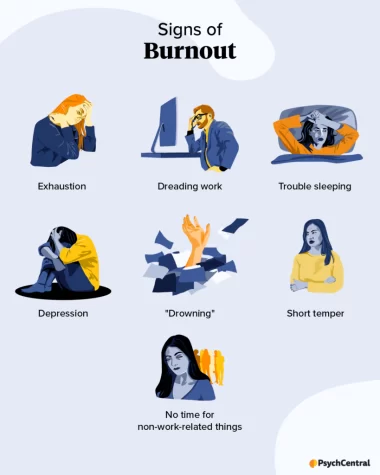
Senior student, Cece Talbert, is experiencing some symptoms of burnout including headaches, lack of motivation, and depression. When what makes his burnout worse he had a common answer among struggling students. “Restrictions make my burnout worse, especially when there are so many strict deadlines.” Not only does Cece need to compete with deadlines and a heavy workload but challenging and important classes as well.
“My most challenging class is TV production, not because it is a hard class but because I’m basing my career off this class and I have to please everyone I can to have a better chance at this career.” With such an important class and the struggle to do well it can be very draining on a students mental and physical health.
Physical signs and symptoms of burnout:
- Feeling exhausted and drained most of the time
- Lowered immune systems- frequent illnesses
- Frequent headaches and muscle pain
- Change in sleeping habits- insomnia
- Mood swings- anger, depression, irritability, anxiety
Not only can burnout cause mental health struggles, but physical health struggles as well. When the mind is under constant stress with very little control, rest, and care for itself, this makes openings for bad things to enter your body. The increased symptoms of depression can lead many students to be hospitalized for mental disorders and psychological ill-health.
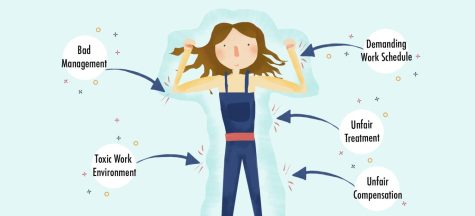
Physical health issues from burnout:
- Increased likelihood for heart disease
- High blood pressure
- Type 2 diabetes
- Respiratory issues
Burnout is not something that should be taken lightly, even neuroscientists have discovered a disturbing link between burnout and effects on the brain:
- Burnout enlarges the brains amygdala- the section of the brain that controls emotional reactions.
- Burnout causes prefrontal cortex- the part of the brain that is responsible for cognitive functioning- to thin. This can occur naturally with age but those under high stress for long periods of time are under more risk for it.
- Parts of the brain that control memory and attention spans, such as the hippocampus, are weakened making learning more difficult.
- Studies have shown that shown that brains of people who are chronically burnet-out, show similar damage to people who have experienced PTSD (Post Traumatic Stress Disorder.)
With these kinds of extreme effects, burnout is no joke. Luckily with some selfcare, and a healthy working schedule they can be helped and even reversed.
Handling Burnout:
- Evaluate your options. Discuss specific concerns with your teacher or supervisor. Maybe you can work together to figure out a better, more effective work schedule.
- Seek Support. Reaching out to friends, family, or loved ones. Support and collaboration might help you cope better with the work load and realize that the world won’t end if you take a load off. The person you talk to doesn’t have to be able to “fix” your stressors; they just have to be a good listener, someone who’ll listen attentively without becoming distracted or expressing judgment. Hanging out with negative-minded people who do nothing but complain will only drag down your mood and outlook, try and limit interactions with someone who might make your mental health worse.
- Relaxing activities. Exploring activities famous for relaxation like yoga can help you feel more at ease. Even doing a relaxing activity like drawing, reading, playing video games, going for walks, cooking, anything you enjoy. Sprinkle time into activities you enjoy, this will help you feel more encouraged to complete tasks you need to complete.
- Get some more sleep. Getting some sleep, proper rest and care can go a long way to recharging your mental ad physical battery.
- Recognize. Understand the warning signs of burnout so you can take the proper precautions to avoid a burnout-breakdown. Set boundaries, learn how to say ‘no’ to requests, this can be difficult but it does a long way when dealing with a heavy workload.
- Set reasonable goals. Don’t set yourself a goal that is impossible to reach, if you fail that impossible goal it will only drag you down whereas when you set a reasonable goal and accomplish that, you will feel more motivated.
- Take a step back. Look at your school and work situation as a whole, ask yourself, have you chose the correct field? or if there is another field you could go in.
Burnout is something that countless students, adults, and workers face on a daily bias and its something that can be incredibly difficult with strict societal demands. But mentally and physical health is just as, if not more important than the work.
Life should not be filled with have-too’s and endless chores, taking time for yourself and letting your body recharge can make all the difference between a good report and feeling like your life is crumbling. Its a very fine line, be careful to make sure your taking care of yourself.
Your donation will support the student journalists of Wesley Chapel High School. Your contribution will allow us to purchase equipment and cover our annual website hosting costs.


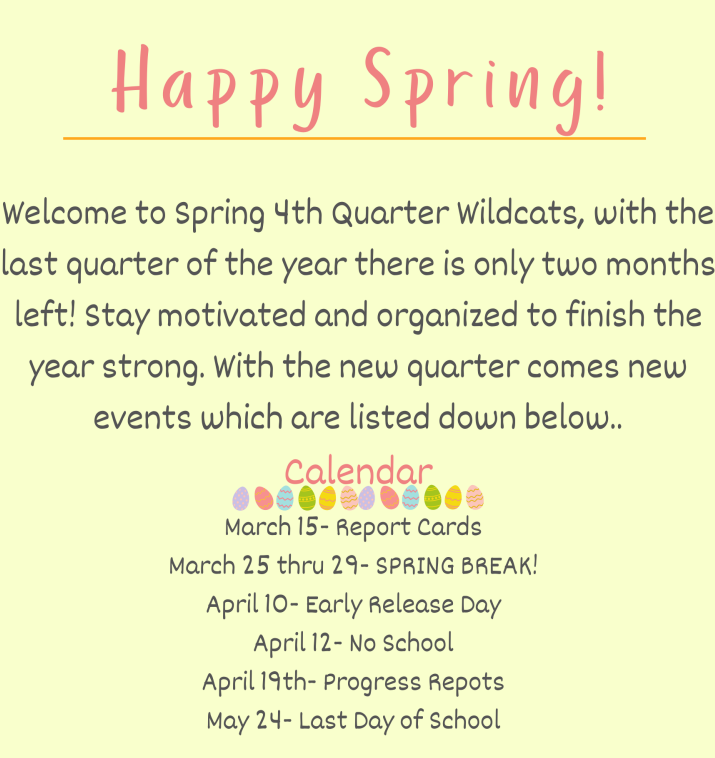














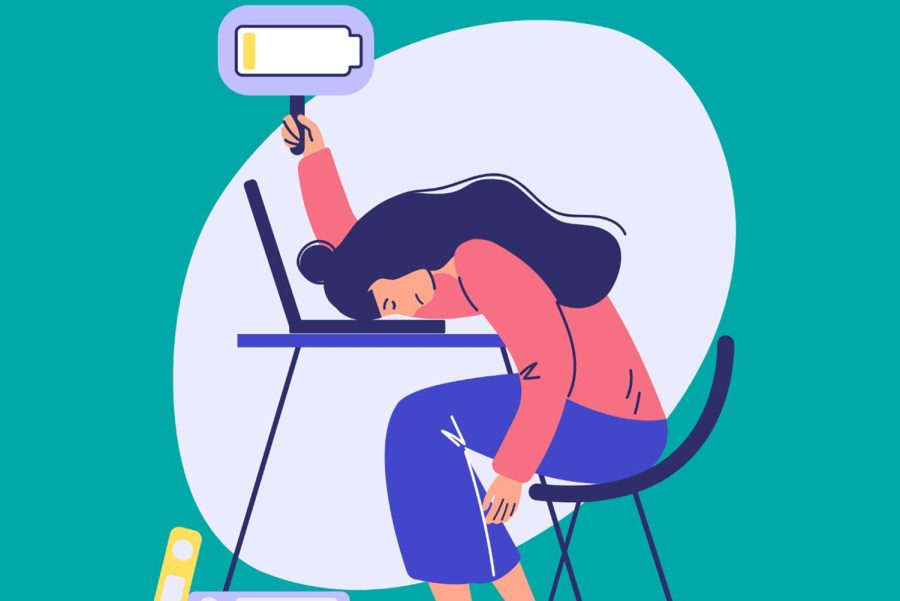











Simon Ocando • Feb 14, 2023 at 5:54 pm
Hey Fynn this a great article very well written congratulations